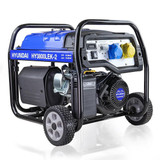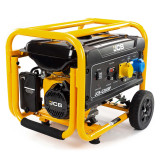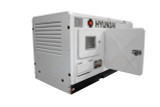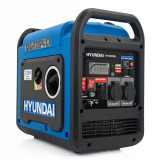
Generators


Hyundai HY3800LEK-2 3.2kW / 4.00kVa* Recoil / Electric Start Site Petrol Generator

Hyundai HY3800L-2 3.2kW / 4.00kVa* Recoil Start Site Petrol Generator

P1 1000W / 1kW Petrol Inverter Suitcase Generator, Lightweight & Quiet Running with DC & USB Outputs | P1000i

JCB 7.5hp Petrol Generator 3.6kW Single Phase 224CC | JCB-G3600P

Hyundai The 8kW/10kVA* Recoil and Electric Start Site Petrol Generator | HY10000LEK-2

Hyundai 4000W / 4.0kW Portable Petrol Inverter Generator, Remote Keyfob & Electric Start, Wheel Kit & Closed Case Design | HY4500SEI

Hyundai Motorhome RV Petrol Leisure Generator | HY3500RVi

A-iPower 3.8kW Petrol Inverter Generator, Sine Wave Output | SC4000i-E-O

A-iPower 1.9kW Petrol Inverter Generator, Sine Wave Output | SC2300i-H


Hyundai H60 60W Portable & Foldable Solar Charger With USB & DC Connectivity

Hyundai 5.2kW / 6.5kVA* Diesel Generator, 3000rpm, 230v Single Phase Output, Silenced Standby Genset | DHY6000SE

JCB 7.9kW / 9.8kVa Petrol Site Generator, 15hp 457cc JCB Engine, Recoil & Electric Start | JCB-G8000PE

Hyundai 3200W / 3.2kW Petrol Inverter Generator, Pure Sine Wave Output, Lightweight, Quiet with Electric Start | HY3250SEi

Hyundai 17kW / 20.4kVA* Compact Diesel Generator, Slow-running 1500rpm, 230v Single Phase Genset with Silenced Canopy | DHY18COM-1

Hyundai 2200W / 2.2kW Petrol Inverter Generator, Electric Start, Pure Sine Wave Output, Lightweight, Quiet Running | HY2250SEi

A-iPower 1.2kW Inverter Petrol Generator, Sine Wave Output | SC1400i
Shop for Generators online with The Power Site. From leisure pure sine wave inverter generators, petrol generators and diesel generators options, long run and silent generators with recoil or electric start, we have the right generator for leisure, industrial, home, office or business back-up power solutions.
Our generators include Inverter Leisure Generators, ideal for camping and power on the go. Also in the petrol range, Hyundai Open-Frame Generators are rugged machines in a variety of sizes and outputs, suitable for building and construction work and more.
Alternatively, a Diesel Generator provides efficient and long-lasting power for home or business use, starting at 6kVA but ranging all the way up to 120kVA, with single or three-phase options. Diesel generators under 10kW are ideal for home or small business emergency backup or standby use. Many models have wheels for ease of transport.
Buy the best quality generators online or in store at our shops in Pembroke Dock, South Wales and Warrington, Cheshire, UK.

